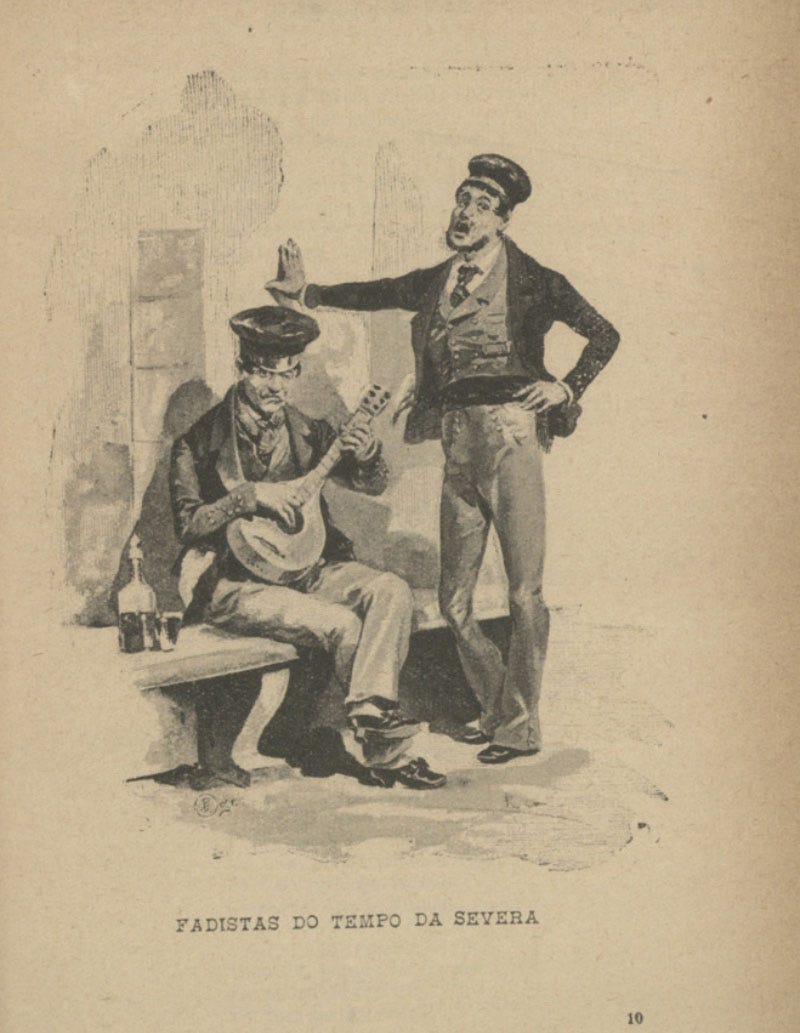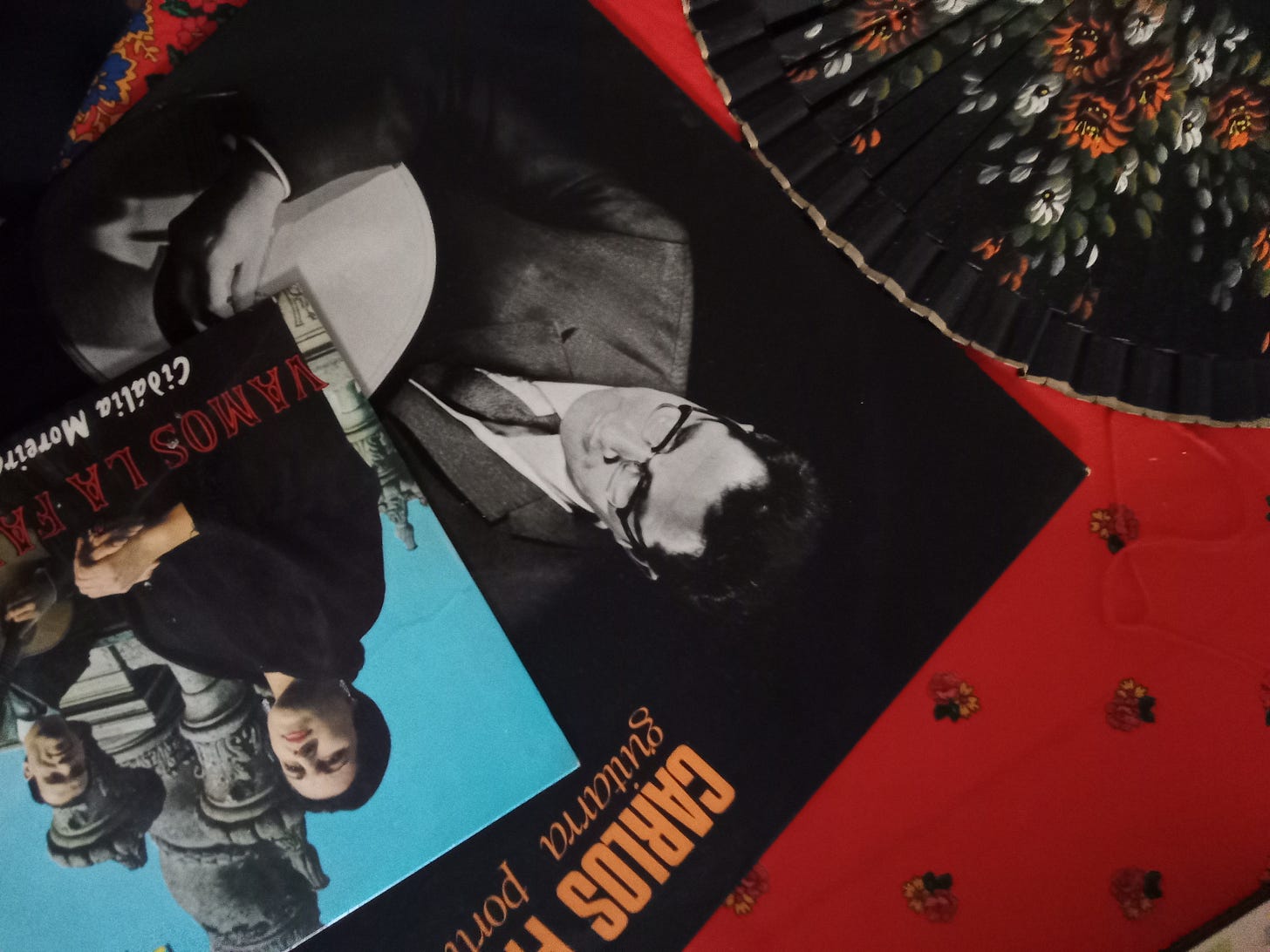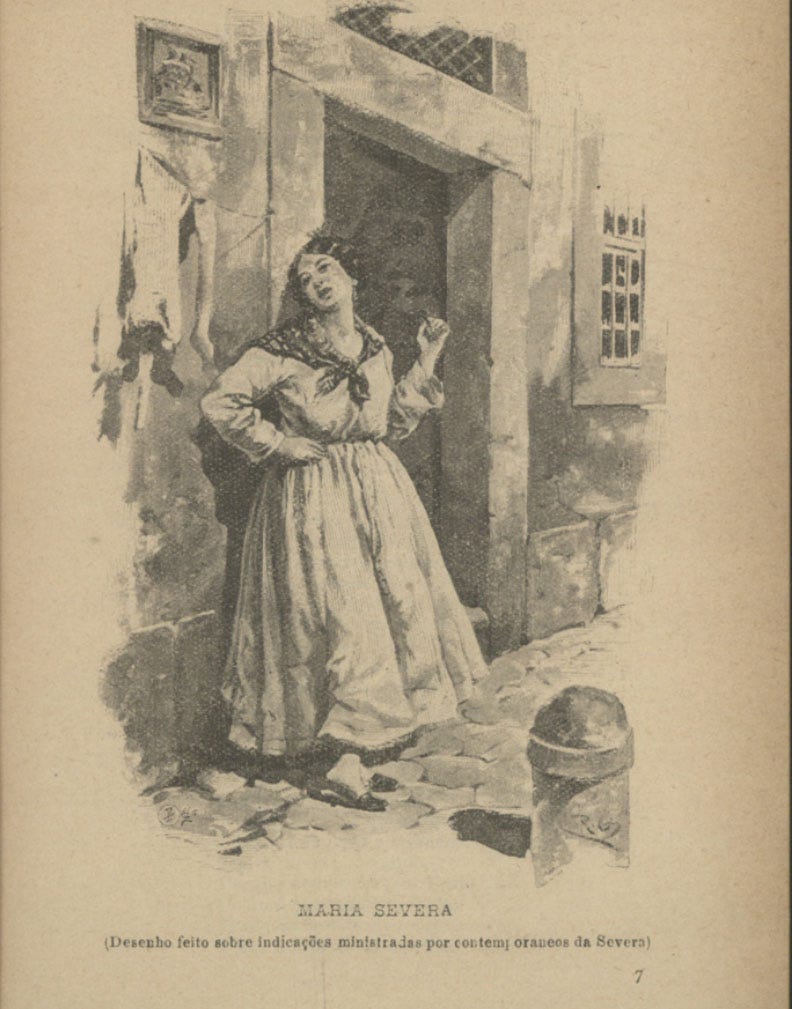Amália Rodrigues used to say that Fado cannot be explainned, it can only be felt - and that is true. What I am going to do is not to explain Fado, but to write a very brief history of Fado and explain its relationship with the portuguese people. To accomplish this I did not based myself only in my personal experience, but mostly gathered information from books that studied Fado.
Fado
Even though Fado is an urban tradition and was created in Lisbon, all portuguese love Fado and identify themselves with it because it’s a reflection of ourselves. Pinto de Carvalho said that “it is through folk songs that a counytry shows more clearly its national character and its costums”1, and Fado does this in a very special way because “no other portuguese folk song portrays the adventurous and dreamy character of our ethnicity, essencially meridional and latin, no other displays so well, with its vague charmeur and poetry, the painful stings of passion, of jealousy and of the regreatful saudade”2. Fado is, indeed, the soul of the portuguese people.
So, to understand Fado, it will be important to know in what way Fado reflects the portuguese character.
“Portuguese created Fado. And there is a reason for having created it. Why did they do that? Because of their nature. We had much reason for complaining, you know? About the world, about the world. We were here, in this place, where no one would come, if they did not want to. It does not have borders with any country, except with Spain, and we were always there with swords, with wars; or the Ocean, which was a desgrace, it was the unknown, it was frightening. And we went to the Ocean in that manner. We had a long time to suffer, to be wating. And that is a grievance. Fado is a grievance.”
Amália Rodrigues
It is common knowledge that the word fado is a latin word (fatum), meaning destiny, and this concept of inescapable evil, because fado is usually used for an evil destiny, is very important in portuguese culture and is an important theme in portuguese poetry. Even popular sayings express this belief, an example would be “fatal as destiny” (fatal como o destino), an expression used to say that something will happen without any doubt, just like destiny will fulfill itself. This belief in fate (fado) did not contradict Catholic doctrine. Father Raphael Bluteau was a french priest and a lexicograph, author of the great work “Vocabulário” in which he wrote that fate was, according to Saint Augustine and Saint Thomas Aquinas, the divine providence who foresees human events3.
“Our people, like our poets, has always been fatalist (…) believing in the fatality of fortune to whom they must obey(…). They started to give the name Fado to the songs that celebrated the hardships of destiny and the belief in the irrevocable law of fate.”
Alberto Pimentel
As a consequence of this, portuguese surrender themselves to destiny without resistance, and even though they may sing and cry about their misfortunes they accept them as innevitable. Fatalism is, then, an important part of Fado and of the portuguese character and culture. Rocha Peixoto said that Fado is “a resignation to the crude and dark empire of destiny, behold what expresses in such dramatic fashion the features of the national soul. The portuguese Fado it’s an entire mentality, an entire history”4.
History
Fado was created in Lisbon by portuguese people. It was inspired by the hardships experienced in the city by the poorer population, those who went to brothels and taverns, those who were criminals, prostitutes - the marginalized.
Fado gave these people the only pleasure they could have: not only they could exorcise their sorrows through poems, but they could do it in a fun environment, with songs, dance and laughter: “In those moments, the common people, without forgeting the hardishps of detsiny, because they could feel them like the sentenced to the galleys feels the weight of the iron chains, experiences the only pleasures that they are allowed to (…): the singing, the dance, the wine, and the love”.5
According to Alberto Pimentel’s research, the word fadista emmerged before the word fado (with the meaning of song), and had a pejurative meaning: “(…)fadista is a person who fulfils a bad destiny; whether it is a man or a woman, prostitute or bully. And we must note that the word fado became a slang word that took an exclusivelly pejorative meaning: Fado life - bad life; fado woman - a prostitute.”6
At that time the fadistas were considered “scum”, because the bullies, stabbers, robbers, murderers were the ones who sung fado7. These men would live at the expense of prostitues and spend their time singing and drinking in brothels and taverns8. Male fadistas were known as “faias” in portuguese slang9.

But some men from good families also enjoyed fado and having familiarity with fadistas - they were called “marialvas”10.
Today fadistas still come mainly from Lisbon neighborhoods, but are respectable people. They begin to learn fado in fado houses as children or as young adults with the help of an experienced fadista. If in the past they had a bad reputation, now they are cherished by all, looked as embassadors of portuguese culture.

Themes
Usualy the poems from Fado songs are written by fadistas and describe their own life experiences. The themes are about love, life struggles and about saudade11. In the past, the fado love poems were very different from the contemporary ones: they were very sensual and lacked tenderness and modesty12. Fados were also about the lower social classes hardships, important popular life events (like the Saint Anthony’s night), about Portugal or Lisbon, or even about religious themes13. Fado also sang about specific social classes such as the sailors14, one of the oldest fados is called “Sailor Fado”:
What makes a song Fado
Fado is composed by the guitar players or by a composer, and it must have a certain rhythm. Usually, the song is written for verses of seven, ten, twelve syllables or quadrains15. The melody does not have fixed lyrics, it is the fado singer who decides which poem he or she will use. Fado never has a chorus16 .
I must enphasize that fado singers do not sing Fado only. They also sing Marchas, portuguese folk songs and a cross-over between Fado and other styles, i.e. Fado Canção.
I hope you enjoyed this little introduction to this amazing music genre. I will continue to write more about this subject in the next few weeks.
CARVALHO, Pinto, História do Fado
CARVALHO, Pinto, História do Fado
PIMENTEL, Alberto, A Triste Canção do Sul, Livraria Central, Lisboa, 1904, pág.7
PIMENTEL, Alberto, A Triste Canção do Sul, Livraria Central, Lisboa, 1904, pág.14-5
PIMENTEL, Alberto, A Triste Canção do Sul, Livraria Central, Lisboa, 1904, pág. 26
PIMENTEL, Alberto, A Triste Canção do Sul, Livraria Central, Lisboa, 1904, pág. 43
PIMENTEL, Alberto, A Triste Canção do Sul, Livraria Central, Lisboa, 1904, pág. 44
PIMENTEL, Alberto, A Triste Canção do Sul, Livraria Central, Lisboa, 1904, pág. 46
https://www.museudofado.pt/historia-do-fado
https://www.museudofado.pt/historia-do-fado
https://www.infopedia.pt/apoio/artigos/$fado
PIMENTEL, Alberto, A Triste Canção do Sul, Livraria Central, Lisboa, 1904, pág. 101
PIMENTEL, Alberto, A Triste Canção do Sul, Livraria Central, Lisboa, 1904, pág. 103
PIMENTEL, Alberto, A Triste Canção do Sul, Livraria Central, Lisboa, 1904, pág. 103
https://www.fado.club/estilos-no-fado/
https://www.fado.club/estilos-no-fado/




